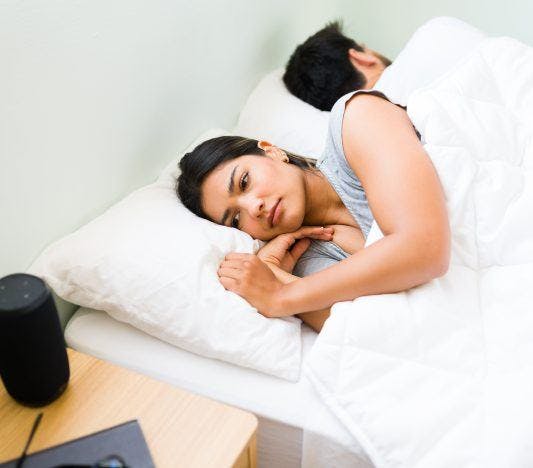You wake up at night to a crunching sound. It’s not the door, not a branch tapping on the window either. It’s your partner, deep in slumber, unaware of his teeth grinding. While this condition is quite a nighttime nuisance, it does more than disrupt your sleep. It can cause long-term dental problems and chronic pain. Bruxism – the medical term – is also more common than you think. In fact, you might have experienced it, too – you just didn’t know it.
Find out why people grind their teeth, what you can do to avoid it, and the possible ways you can deal with its effects.
What Is Bruxism?
The American Academy of Sleep Medicine defines bruxism as a repetitive jaw-muscle activity involving teeth grinding or clenching and/or mandible bracing or thrusting. Sleep bruxism is more common, but you might catch yourself rubbing your teeth together during the day, too.
Although gritting your teeth isn’t much of an issue on its own, its many side effects can present complications. A 2016 paper in the Journal of Conservative Dentistry reveals that persistent grinding can cause problems in your jaw joints. These can lead to jaw pain, headaches, tooth wear and tear, gum issues, dental fractures, and even more complex issues, such as hearing loss, tooth loss, and even social anxiety.
Why Do You Grind Your Teeth?
Around 10 years ago, teeth grinding fell under the dysfunctional or pathological category. However, according to a study British Dental Journal, it is now considered a centrally controlled condition, meaning it can be triggered by psychological, social, and psychological changes. Some scientists even go so far as to propose that teeth grinding has a protective benefit – hypothetically, it helps maintain airways and stimulates saliva production.
But whether or not bruxism saves you from imminent harm is one thing. You must save yourself from its painful consequences by managing its possible causes.
1. You’re taking your anxiety out on your teeth.

Clamping down on your teeth has always been seen as a physical manifestation of stress. A Journal of Research in Personality study verifies previous research on this association. It confirms that individuals with depression, anxiety, and greater life problems tend to experience more bruxism incidences. Even lab rats exposed to emotional stress led to brux-like symptoms.
The experiment concludes that those with high emotional stability report a lower rate of teeth grinding.
2. You may have hyperacidity.
Experts have long analysed the link between acid reflux (particularly gastroesophageal reflux disease or GERD) and teeth grinding. Lecturers at the 2017 Seattle Study Club Symposium suggested that swallowing is the natural reaction to bringing down acid. To help move things along, the body, in a way, tricks itself into “chewing,” thus prompting saliva production and aiding in swallowing.
However, acid reflux is often misdiagnosed as grinding since both result in enamel erosion. You must always consult with a specialist to help assess your specific condition.
3. Substances may be behind your sleep bruxism.
Drinking caffeine and alcohol and smoking are also culprits of teeth grinding – for varying reasons. Alcohol alters sleep patterns, which can hyperactivate muscles, including the ones in your jaw. On the other hand, caffeine can worsen feelings of anxiety and stress. The stimulant in nicotine, an ingredient in cigarettes and cigars, also prompts a similar effect.
Those who drink and smoke have a higher chance of developing bruxism. However, according to the Australian Dental Association, certain drugs and medications can also trigger it.
4. Parasites may be behind it.

Bruxism is also common among children. But the usual suspects of worrying and teething may not be the only reasons. A study in the Dental Research Journal found that pathogenic parasites, particularly pinworms, may start teeth grinding in kids. However, the Centers for Disease Control and Prevention states that the link may also be explained by the stress of the infection’s symptoms. Either way, make sure to practise hand hygiene to reduce the risk of unsavoury germs.
5. Check your breathing.
There is no clear-cut explanation for the relationship between sleep apnea and teeth grinding, except for the fact that those afflicted with the breathing condition usually end up gnashing on their teeth during slumber. One theory, detailed by the Sleep Foundation, states that when your airway closes from obstructive sleep apnea, your chewing muscles are activated to help reopen it.
Similar to how bruxism theoretically protects against acid reflux by spurring your salivary glands, grinding also helps lubricate the dry throat that’s often symptomatic of sleep apnea and other sleep-related breathing issues.
While experts haven’t confirmed whether malocclusions cause bruxism, there is an unquestionable association between the two conditions. Too much clenching can cause your teeth to move and shift, opening you up to other alignment-related dental issues, such as difficulty brushing and flossing. Protect your teeth from these consequences with the proper tool. For example, you can use aligners, such as ClearCorrect, to fix any crookedness from teeth grinding. ClearCorrect uses digital scanning to create a barely-there mouthpiece that applies precise pressure to straighten out uneven teeth.
There’s still so much mystery surrounding teeth grinding, but the solution is clear. Finding its root cause is the first step to having better teeth, better health – and even a better night’s sleep for everyone.
References:
Beddis, H. P., Pemberton, M. N., & Davies, S. G. (2018). Sleep bruxism: an overview for clinicians. British Dental Journal, 225(6), 497–501.
Suni, E., & Suni, E. (2023, March 2). The Link Between Sleep Apnea and Teeth Grinding. Sleep Foundation.
Sutin, A. R., Terracciano, A., Ferrucci, L., & Costa, P. T. (2010). Teeth grinding: Is Emotional Stability related to bruxism? Journal of Research in Personality, 44(3), 402–405.
The Correlation between Intestinal Parasitic Infections and Bruxism among 3-6 Year-Old Children in Isfahan. (n.d.). PubMed.
Yap, A. U. J., & Chua, A. P. (2016). Sleep bruxism: Current knowledge and contemporary management. Journal of Conservative Dentistry, 19(5), 383.



